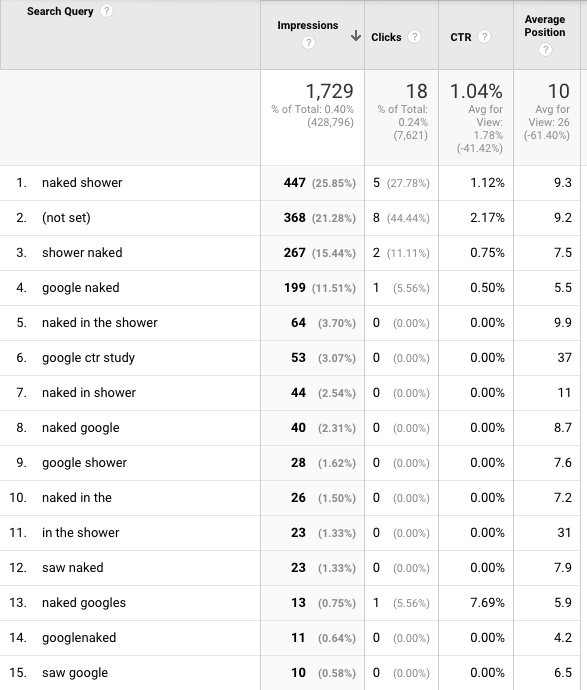Well, this article accidentally turned into a case study within a case study. I know, we just can’t stop picking on Google, the most brilliant artificial intelligence ever created. Pretty big of us, right?
As a recap, we picked up on an extreme anomaly in our data where we ranked No. 2 in Google for the search term “LinkedIn.” Within 24 hours, and with a 0.01 percent click-through rate, Google deemed our blog post a bad result for that query (duh) and we got booted to the third page of results. We suspect that this was a direct result of the Google algorithm’s weighting of click-through rate.

Alright, so let’s get to the point of this post. Google tells us to assume two things as gospel about their algorithm:
- Search is semantic, meaning Google is teasing out the meaning of articles rather than robotically indexing the actual words and meta data on-page.
- On-page factors still matter, but not as much as when Google ONLY had on-page and metadata to work with.
This is all Hummingbird, right? Old news.
Okay, so here’s the dilemma…
The title (and the H1 tag) of the article was “I saw Google naked in the shower.” These are the only on-page instances that reference the word “naked,” or anything remotely similar. Further, if you read the article, you will note that the article has nothing to do with nudity. As a matter of fact, it’s particularly boring in comparison.
For the sake of transparency, let me prove that we weren’t hiding anything in the metadata:

See? No funny business. Can we agree that the article is definitely not about nudity?
Well, I find that very interesting, because, unlike you and I, Google thinks the article is a glorified how-to guide for exhibitionists:

One. Relevant. Result.
Fourteen of the 15 queries this page is ranking for are nudity-related. I’ll say it again – this keyword appeared in the title tag and H1 tag only.
Surely a title tag couldn’t dictate 95 percent of your page’s rankings, right? I agree. So let’s play Devil’s Advocate – maybe there are off-page factors that are influencing things.
Here’s the link profile I pulled using Moz’s Open Site Explorer:

Take a second and read the anchor text for some of these links:
- “Excellent, recent case study on this”
- “Short Case Study on CTR vs Ranking
- “www.brafton.com”
- “Read more…”
Off-page nudity influences? Nope. So what do we have left? Social signals? There are conflicting opinions on that, and Matt Cutts says definitively that it doesn’t matter, but let’s be thorough.

The numbers are good, particularly due to some love from Rand Fishkin… but definitely not groundbreaking.
Rank for “LinkedIn,” get loads of impressions but no clicks, fall to pg. 3… More evidence G’s using engagement
via https://t.co/mUgEVqeFH5 pic.twitter.com/WcwzT6LiE3— Rand Fishkin (@randfish) January 31, 2017
This begs the questions: Are on-page factors still weighted more heavily than Google is leading us to believe? Is semantic search technology further behind than implied? Is it possible that Hummingbird is more targeted to local search?
At this point, I have more questions than answers. But one thing is for certain, that article was not about nudity… but Google thinks so.





